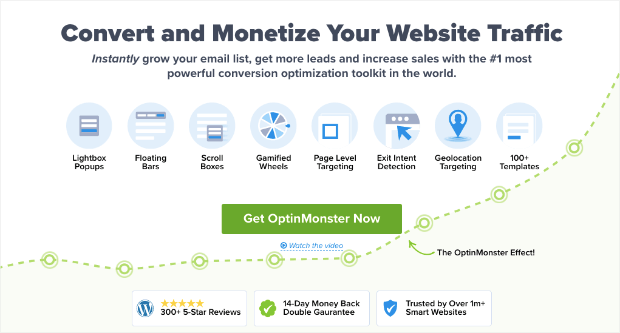United Kingdom is more like a dream destination for most of the international students.
Wednesday, June 15, 2022
Wednesday, June 8, 2022
10 Proven Tips to Create Blog Posts That Convert Like Crazy by Nathan Thompson on March 1, 2021
Are your blog posts not converting as well as you’d like them to? Want to know the secrets of how to write a blog post that converts? In this article, we’ll share some tips that will help you write a blog post that gets clicks and sales!
You see, most people that visit your blog post usually leave without reading it all the way through.
And the worst part is that an even larger percentage of people who see your blog post on your social media platforms never even click on it.
You really only have 2–3 seconds to grab your user’s attention, convince them to click, and actually read your blog post.
So how do you make sure that your content marketing efforts aren’t going to waste? Well, you follow these tips, and we promise it’ll help you write blog posts that convert.
1. Know Your Audience

Before you start writing, it’s crucial that you know who your audience is, and what they are looking for.
Instead of guessing what your audience needs or wants, try to make data-driven decisions by doing industry research and competitor analysis.
Sounds complicated? It really isn’t.
The easiest way to get information about your audience is by using the MonsterInsights tool. It’s the best Google Analytics tool for WordPress and we strongly recommend using it. Here’s why:
- Turns complicated website data into simple reports that are easy for anyone to understand
- Gives valuable insights into who your audience is and where they are coming from
- Helps you understand what’s working and where you need to improve
- Dedicated reports for publishers that show top performing landing pages, exit pages, and links
- Calculates average scroll depth so you’ll know how far visitors read your post before they lose interest
- Shows which search terms get the most clicks and impressions
You can install MonsterInsights like you would any WordPress plugin and then connect to your Google Analytics account. If you need more help on this, see our guide to setting up MonsterInsights.
Once that’s done, you can access the MonsterInsights dashboard from your WordPress admin area.
You’ll see reports that tell you how much traffic your site gets, how long your users stay on your site, and how quickly they bounce. This will tell you if visitors find your content interesting or not.
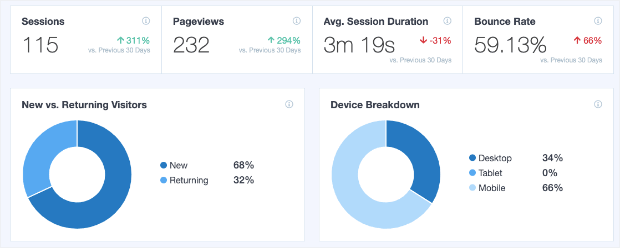
You can also see where your visitors are coming from by country and source.
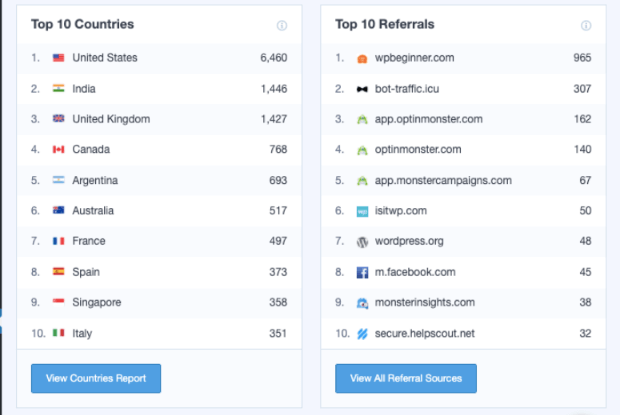
So you’ll know whether visitors are finding your site through social media or other websites. With this understanding, you can alter your content to match their interests.
Next, you can see which posts are performing well. You can then analyze these posts to see what works with your audience.
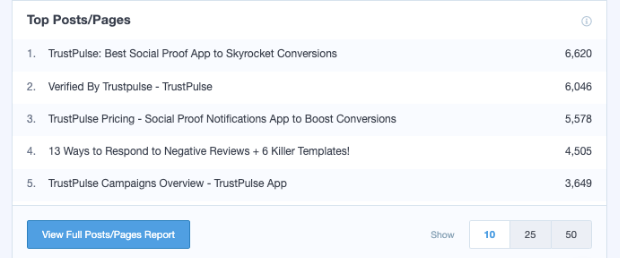
MonsterInsights has everything you need to understand your audience and create blog posts that actually convert!
Now, if you need more blog post ideas, we’ve created a list of 103 blog post ideas as well as 73 types of blog posts that are proven to work.
2. Write Compelling Headlines

If you don’t have a compelling headline, then there’s a very good chance that your blog post will not be read or shared.
As humans, we’re shallow. We judge a book by its cover and a blog post by its title.
That’s why your blog post title is crucial for the success of that article.
If you’re using MonsterInsights, there’s a built-in headline analyzer tool. It appears on the top of the post or page editor in WordPress.
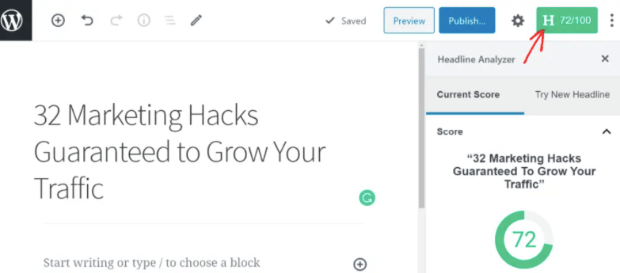
Just click on the headline analyzer in the top right corner and it will rate your copy on a scale of 1 to 100. It also provides suggestions on what words to use and the word count limit.
If you don’t have MonsterInsights installed, you can use the headline analyzer on OptinMonster for FREE!.
It will make sure you’re writing the most clickable and SEO-friendly headlines that bring in more traffic.
3. Add Subheadings and Shorter Paragraphs to Break up the Page

Formatting is super important for blog posts. There’s nothing worse than reading a blog post that’s just one giant paragraph.
Most of the time people skim through the content before they actually decide to read it, so we always recommend breaking up your article with subheadings.
Anything you can do to make it easy on the user’s eyes is going to help them read your blog post (and take the action that you want them to).
Another quick tip is to use shorter paragraphs to help your readers work their way through your post.
At OptinMonster, you may have noticed that we tend to break up each paragraph every few lines or so. Here’s an example from one of our posts on eCommerce optimization:
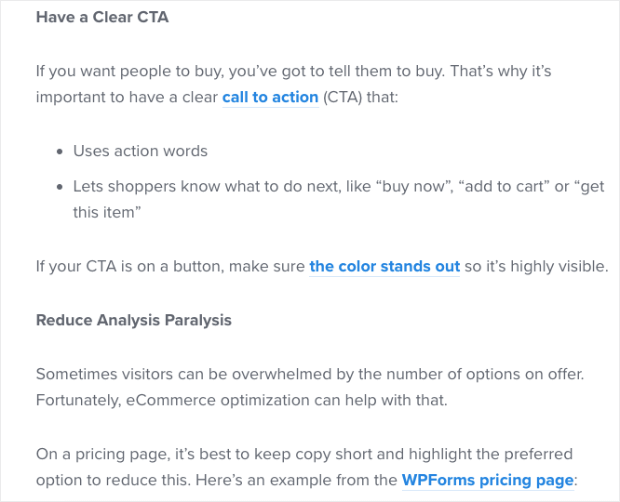
Notice how small the blocks of text are. Usually, we stick to 2–3 lines of text, maybe 4 if something really needs explanation.
We do this to help our readers absorb all the information coming their way in as short amount of time as possible.
Remember, not all kinds of content are created equal. In books, big blocks of text are fine. But blog posts are different. They’re designed to give highly focused, quality information in a short amount of time.
In other words, we know our audience isn’t sitting down to read War and Peace. They want to know how to drive traffic, convert leads, and increase their revenue.
And they want all that information yesterday.
So, organize your ideas through subheadings and keep your paragraphs short to help your reader absorb more information in less time.
Sometimes you can even go a step further than short paragraphs, which brings us to our next tip…
4. Use Bullet Points
People tend to skim blog posts before they decide to read them. That means you need to make sure to highlight your best information. That way, they can quickly see that your post is worth their time.
Aside from subheadings, bullet lists are perfect because they’re very easy to skim through.
Here are some tips that we use to write bullet points that people will actually read:
- Express clear benefits. Think of bullets as mini-headlines.
- Keep your bullets symmetrical. 1-2 lines each.
- Avoid bullet clutter. Don’t write paragraphs in bullets.
- Remember bullets are not sentences. They’re just like headlines.
Again, people don’t come to blog posts for leisurely beach reading. They want specific information and don’t want to work to get it.
Bullet points are an excellent way to spoon-feed your audience in a way that keeps them coming back for more.
5. Add Images

The human brain processes visual content a lot faster than text-based content. That’s why adding captivating images can help boost your engagement.
There are tons of awesome free resources for finding high-quality royalty-free images.
But honestly, you’d probably be better off taking your own photos or creating your own images. Stock photos are great when you’re in a pinch (and we definitely use them from time to time!), but they aren’t super personal.
For OptinMonster, we also use Shutterstock, a premium stock photo site. This allows us to create custom images for our post’s featured image:
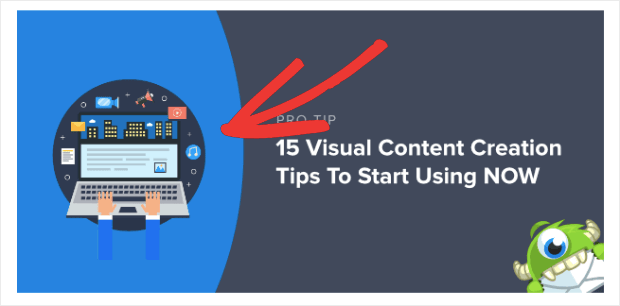
Or to create interesting images to break up the text in our article (like the image under our next tip, for example ?).
6. Optimize for SEO

In the blogging world, SEO can be tricky. On the one hand, you should never put SEO over your user’s experience (UX). On the other hand, you shouldn’t ignore SEO, either.
The goal is to find the balance.
The truth is that organic searches on Google drives a huge chunk of the traffic for most websites. OptinMonster included.
If you want to maximize your SEO ranking, then we highly recommend that you optimize your blog post for important SEO ranking factors.
Now, a few years ago, this meant hiring an SEO analyst but now there are tools that make it easy to do it yourself.
All in One SEO is the most powerful and easy to use WordPress SEO plugin. Here’s what you get:
- Actionable checklist to optimize each page
- Detailed content and readability analysis
- Easily add SEO elements like meta title, description, and focused keywords
- Add XML sitemaps and schema markups to improve SEO rankings
- Competitor analysis to outrank the competition
- Integrate with other tools and social media platforms
It’s the most beginner-friendly SEO tool so anyone can use it and get their pages to rank.
For more details on what you should optimize, check out this 14-point blog post checklist to use before you hit publish.
7. Add a Clear Call-to-Action
In the spirit of saving the best for last, here’s our last tip for writing a blog post that converts: add a clear call-to-action.
Whether it’s to ask your readers to leave a comment, share your blog post, follow you on social media, or purchase your product, make sure you clearly state what you’d like them to do.
A good call-to-action is something that’s easily distinguishable and stands out.
Usually, for your blog posts, the call to action will ask readers to share their content if they liked what they read.
If you follow OptinMonster’s blog, you’ve probably noticed that’s how we finish most articles. The call to action looks something like this:

If your content is stellar, most readers will be thrilled to share it. And if your product is awesome, most people will be happy to buy it.
But in order to get them to do either, you need to ask!
8. Set Up an Exit-Intent® Campaign
If you’re serious about converting your visitors into subscribers and customers, then you need more power!
Blog posts are great but there’s only so much they can do. That’s why lead generation tools exist in the market.
The most powerful lead generation and conversion optimization tool is OptinMonster.
OptinMonster lets you create conversion campaigns such as lightbox popups, slide-ins, notification bars, banners, and scroll boxes.
Coming to why you need OptinMonster, 75% of visitors who leave your site will never return. So you only get that one chance to convert them before they leave your site.
You can do this using OptinMonster’s Exit-Intent® technology. This detects when a visitor is leaving your site and displays a popup.
You can ask them to subscribe to your emails or newsletters, or drop them an offer they can’t resist if they buy now!
See how Shockbyte more than doubled their conversion rate with Exit-Intent® using this popup.
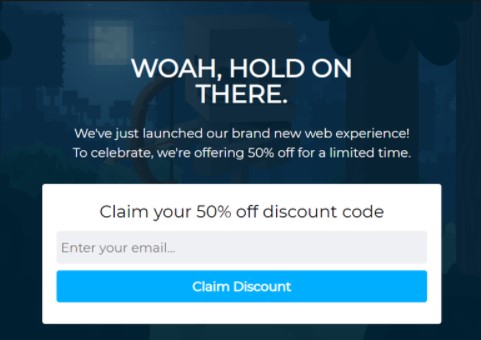
How is this possible? Let’s take a look at OptinMonster’s powerful features.
- 100+ readymade templates to create stunning campaigns in minutes
- Drag and drop visual builder that anyone can use
- 9 different campaign types to choose from such as popups, floating bars, and gamified wheels
- Tons of targeting options such as Exit-Intent;reg, time spent on page, visitor’s source
- A/B testing to optimize results
- Analytics and insights to improve campaigns
Once you install and activate OptinMonster on your site, you simply need to choose a campaign type and a template.
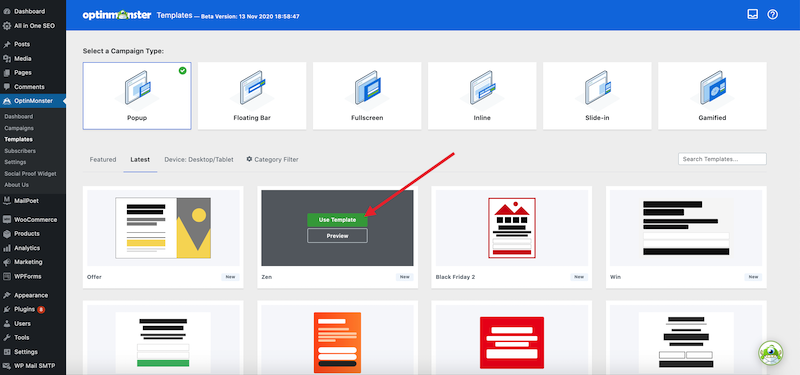
Then, use the drag and drop builder to customize the popup. After this, you can set up the display rules to control when, where, and to whom your popup is shown.
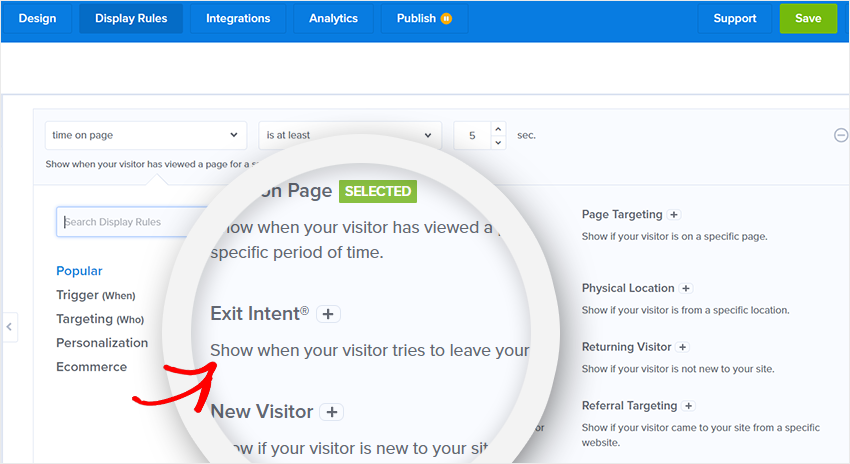
After that, you simply need to publish your campaign and watch your conversions skyrocket.
9. Set Up Recent Activity Notifications
Another great way to increase conversions on your blog posts is by using social proof like recent activity popups.

Social proof works in two ways. First, it uses the fear of missing out (FOMO) which is basically wanting what others have.
It also builds trust and confidence in visitors. This is because we are more likely to take an action or buy something if we see others are doing the same.
It’s as simple as that!
The best way to add social proof to your site is using TrustPulse.
It lets you easily create and customize non-intrusive popups on your site. You can decide what activity you want to capture such as signups, downloads, and purchases.
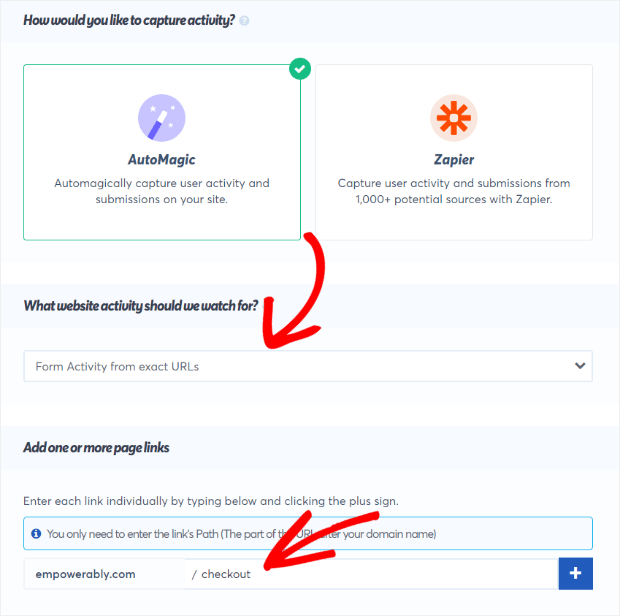
You can control when, where, and to whom the popups are displayed. So you can target different audiences and show popup campaigns that are more likely to convert.
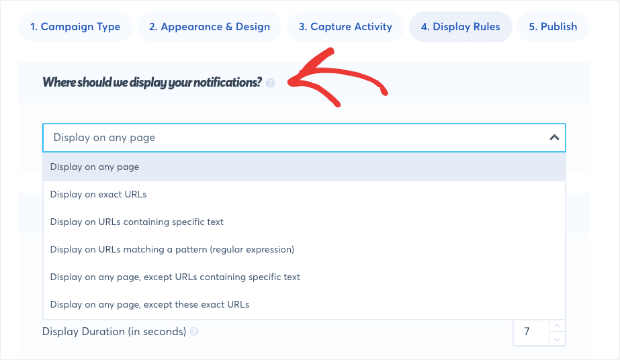
For instance, on your homepage, you can display welcome notifications and all recent activity. But on high converting pages, you can display recent sales to maximize conversions.
For more on this, check out more ways to use social proof to increase your conversions.
10. Send Blog Post Web Notifications
Web push notifications let you engage with your readers long after their first visit to your site.
So even if they didn’t convert the first time, you can use push notifications to get them to come back to your site.
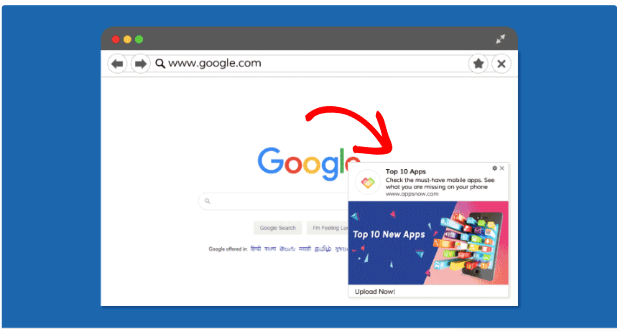
To create these notifications, you can use PushEngage. It’s the most powerful push notification tool and it’s easy to use.
When you sign up, PushEngage will start displaying a subscribe option on your site.
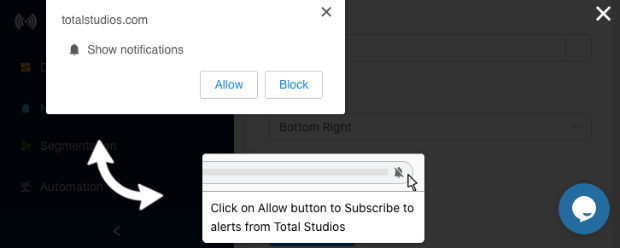
Visitors simply have to click on the ‘Allow’ button to subscribe. There’s no need for an email address or phone number, so it’s easier to get more subscribers.
PushEngage will also create a notification for every new blog post published and send it to your subscribers. Or you can choose to create and send your own custom notification in under 5 minutes.
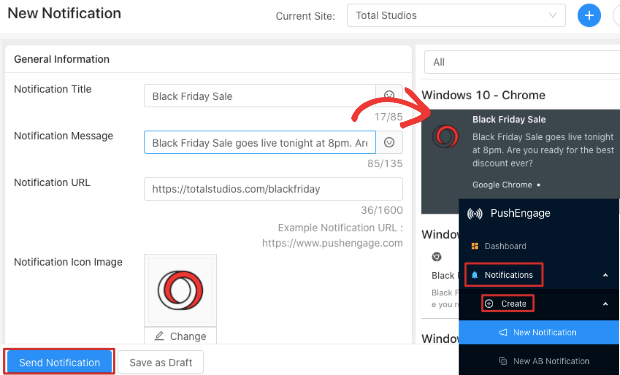
Push notifications are the best way to rekindle a visitor’s interest and bring them back to your site.
If you follow these tips listed above, you can see way more conversions than you have before.
And if you’re ready to skyrocket conversions right away, get OptinMonster now!










